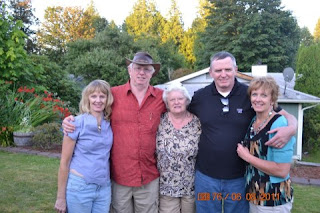While uploading my graet-grandma Rosie's pictures to FamilySearch, I came across a picture of a mangled car with the caption "wreck Bud Darrow was killed in." I have no idea what could have caused a car to look like it did, but it must have been something major.
I had a little morbid curiosity and wondered what a colorized version of this picture would look like, and fortunately there's no evidence of any gore or anything. But it seems some time had passed from when the wreck happened and the picture was taken, as the ground doesn't look disturbed. .
That led me to wondering what might have been said in the local newspaper about the wreck. It turns out, Bud appears to have fallen asleep at the wheel somewhere between 5 and 8:30 am (pretty early to be on the road) and crashed into a tree stump. A driver in another car somehow found the wreck, and Bud was taken to a hospital, where he died that evening.
I found an online family tree for Bud, and learned his parents were Walter Darrow (who died in 1947) and Ida (Coulson) Darrow. Ida's family was from Minnesota and Wisconsin, while Walter's side came from Pennsylvania. From what I can tell, Bud wasn't related to my great-grandmother Rosie Wagner or her huband, so he may have been a friend or acquaintance. It's sad that he survived World War II, only to die a few years later in a car accident. However he was connected to my great-grandparents, it's interesting to me that grandma Rosie felt a picture of his final car accident was important enough to remember to include it in her family photo album.




















